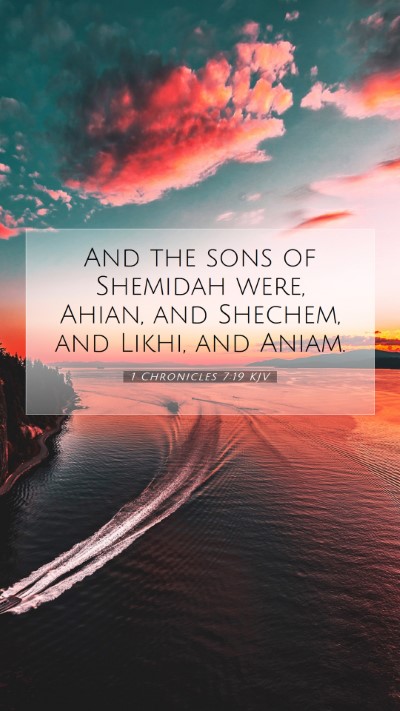Bible Verse Meaning and Commentary: 1 Chronicles 7:19
The verse 1 Chronicles 7:19 states: "The sons of Ephraim were Shuthelah, and Bered his son, and Tahath his son, and Eleadah his son, and Tahath his son." This verse presents a genealogical account from the tribe of Ephraim, highlighting the descendants and lineage of Ephraim.
Overall Significance
The genealogies in the Bible are not just historical records; they serve as vital links in understanding God’s covenantal promises and the unfolding of biblical history. This particular verse encapsulates several themes pertinent to biblical exegesis:
- Importance of Lineage: This verse emphasizes the value placed on heritage and lineage among the tribes of Israel.
- Role of Ephraim: Ephraim is recognized as a leading tribe in the northern kingdom of Israel, and a detailed family history reflects his significant role.
- Covenantal Faithfulness: The genealogies reinforce God’s faithfulness to His promises across generations, ultimately leading to the Messiah.
Commentary Insights
Matthew Henry's Commentary
Matthew Henry notes that genealogies serve as a reminder of God's faithfulness in preserving the lineage of His chosen people. These records highlight the providence of God in maintaining a structured society within Israel. Henry emphasizes that the mention of these names may seem trivial, but they contribute crucially to the history of redemption.
Albert Barnes' Notes
Albert Barnes provides insight into the importance of keeping track of lineage among the tribes. He points out that the detailed accounts of family lines served to establish rightful claims to land, priesthood, and leadership. Barnes mentions that understanding these names and their placement aids in grasping the broader narrative of Israel’s history and God’s plan.
Adam Clarke's Commentary
Adam Clarke elaborates on the historical significance of Ephraim and how his descendants became influential within the nation of Israel. Clarke remarks on the continuity of God's plan through families and how these genealogies connect to larger themes of redemption and promise.
Theological Implications
The mention of father and son relationships stresses the value of familial bonds in a society where lineage determines identity and destiny. This principle applies not only to the Israelites but also in the context of the broader biblical narrative, linking believers collectively through faith.
Applications for Today
In contemporary times, this verse challenges readers to reflect on their own heritage and the importance of family connections in their spiritual journeys. It teaches that each person contributes to a larger narrative within God’s redemptive plan.
How to Apply
- Explore Family History: Consider researching your own family tree and reflect on the spiritual influences that have shaped your life.
- Understand Place in Community: Just as the tribes had roles in their society, think about your contribution to your community and church.
- Faithfulness Across Generations: Commit to passing down stories of faith and values to future generations.
Cross References
- Genesis 48:1-22 - Jacob's blessing on Ephraim and Manasseh.
- Exodus 1:1-7 - The genealogy of the Israelites in Egypt.
- Joshua 16:1-4 - The boundaries of the territory allotted to Ephraim.
Conclusion
The detailed genealogical account in 1 Chronicles 7:19 serves multiple essential purposes in the broader biblical context. It reinforces the importance of heritage, faithfulness, and the unfolding narrative of redemption within the community of believers. Understanding such passages enriches Bible study groups and individual studies alike, revealing the intricate plan of God throughout history.


